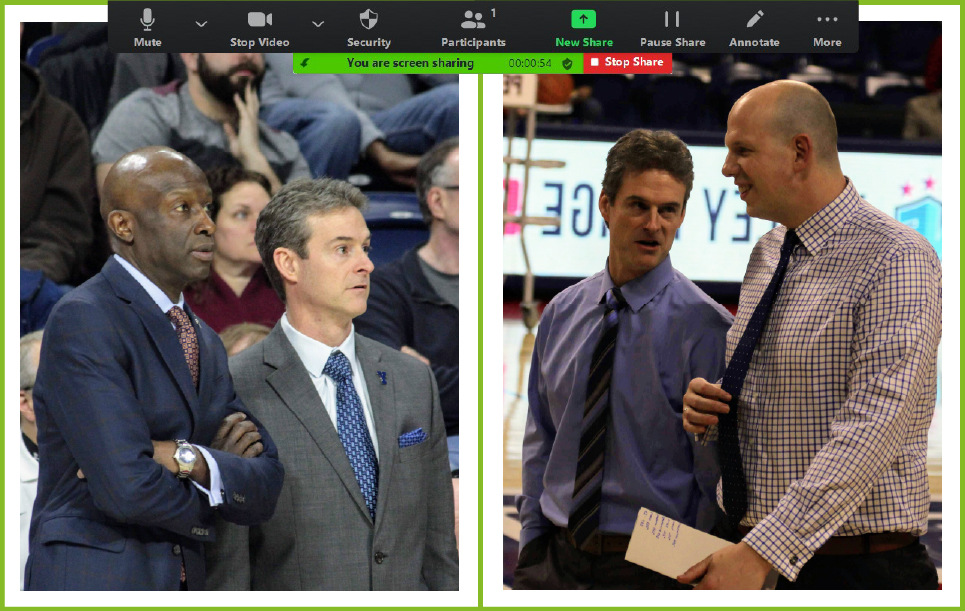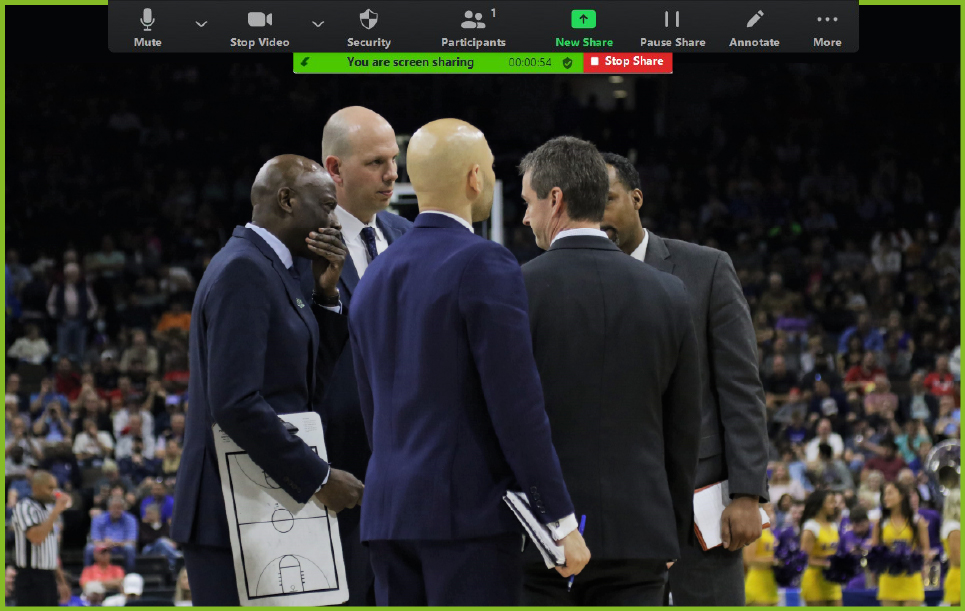MEN’S BASKETBALL: With dead period extended, remote recruiting the new norm for Yale staff
Coaches are away from gyms and the usual summer shoe-brand tournaments, forced to find creative ways to connect with recruits and evaluate skill with sometimes limited footage.

Graphic: Christie Yu; Photos: David Silverman, William McCormack
In July 2019, before anyone knew COVID-19 would curtail the 2019–20 college basketball season, recruiting took Yale men’s basketball associate head coach Matt Kingsley across the country.
Kingsley hopped to a new city about every other day. He spent a couple nights in California and a few days in Las Vegas and then came Orlando, Philadelphia, Chicago, Atlanta and Indiana — all in one month.
The frequent travel is nothing unusual for Division I basketball coaches, who typically spend much of their summer on the road taking in regional high school camps and grassroots basketball tournaments hosted by the major sneaker companies, Nike, Adidas and Under Armour.
But as is true for so many professions this summer, the pandemic has disrupted coaches’ usual routines, changing the way they can evaluate and recruit. With cases spiking nationally for a second time and an NCAA-mandated dead period in place through at least August 31 — prohibiting official or unofficial visits to campus and any in-person recruiting or evaluation — coaches are away from gyms and summer tournaments, forced to find creative ways to connect with recruits at home and evaluate skill with limited footage.
“It’s the evaluation part that’s the problem,” head coach James Jones said last month. “As a matter of fact, you can recruit and talk to guys and be on Zoom, and that’s really good … because they can’t get to campus. But you can’t evaluate in the same way, so you have to be really good as a student watching film and trying to find the guys that work for you.”
Assistant coach Justin Simon ’04 noted that conducting virtual evaluations now is much easier than it would have been a decade ago. Almost every recruit has at least some film readily available, Simon said, and the quality tends to be good enough for use. Much of the footage exists on YouTube or Hudl, a video hosting service that many high school athletes and coaches use to store highlights and game film.
Still, footage can quickly become outdated, especially given how fast some high school basketball players develop, grow and improve. Film from a December game early in the high school season might not accurately reflect how a prospective student-athlete would be playing with his AAU team in July.

Although Kingsley said he thinks the Bulldogs have done a good job of gathering up-to-date film and highlights, he still considers live evaluation the most important piece of their recruiting process. Deciphering certain attributes, like body language, is not feasible over film.
“One thing that we’ve been really good at is recruiting the right kids,” Kingsley said. “There’s lots of kids that have big-time offers out there that we don’t offer or have any interest in just because we don’t like how they play. That comes from a live evaluation more than anything, so that’s missing.”
Kingsley added that Yale is fortunate the Ivy League recruiting process tends to happen slightly earlier than other conferences in Division I basketball, largely because application deadlines that schools in some other conferences may not have to actively consider are hard and strict in the Ancient Eight. The Bulldog staff is proactive in evaluating skill and gathering data on young players, and Kingsley said Yale usually finalizes its incoming class by October or November of committed athletes’ senior year.
Gauging academic ability presents another challenge. Beyond assessing how recruits might fit into the program when it comes to basketball, canceled rounds of standardized testing have made it difficult to judge academic fit for the University. Simon said about half of the rising high school seniors they are evaluating have a standardized test score, and many among them have not had a chance to take it a second time and improve.
Having finalized its incoming class of 2024 last fall and unable to recruit graduate transfers, Yale did not have to scramble when much of the country shut down in mid-March. Coaches are still extending offers this spring — 6-foot-7 guard Nate Santos, for example, received one on June 12 — but Kingsley said those in touch with Yale are “almost exclusively kids that we’ve seen live, have been to campus and we’ve been recruiting.”
“Coach Jones has been doing this for 21 years,” Simon said. “We don’t feel the urgency right now or the rush to start offering kids that we haven’t seen. We just want to make sure they feel good about it and we feel good about it on both ends.”
Even for veteran coaches like Jones, there is simply no way to replace the in-person evaluation to which college basketball staffs are accustomed. Tournaments from April to July usually represent a crucial stretch for high school recruits, a time when college coaches usually spend less time with their own team and focus on piecing together their future roster.
The pandemic has changed that. For one, Jones said, his current squad has spent a lot of time together on Zoom. The coronavirus coupled with George Floyd’s death, alongside other instances of police brutality and systemic racism, have sparked conversation and inspired the team to virtually connect. Jones said he has had more summer conversations with this year’s team than he has had with any previous group he has coached.
When it comes to time spent recruiting, the virus has upended the traditional calendar, changing coaches’ schedules. Kingsley said the Yale staff usually tries to cast a wide net, often splitting up to see different games in different cities.
In addition to nearly all of July, coaches usually spend at least two weekends in April and two weekends in June at tournaments or showcases, Simon said. The Bulldogs also typically host their own high school camp in New Haven for a weekend in June and a weekend in August. Peach Jam — Nike’s championship event for its Elite Youth Basketball League (EYBL) — would have taken place this week.
“We might be in the same city for a day, but for most part we’re trying to spread ourselves out,” Kingsley said. “If one of your top recruits is playing in this city, and another one’s in this city and another one’s in this city, you need to be in as many places at once as you can.”

When he was about two months into quarantine this spring, Simon realized that he would have been traveling half the time in a normal year — for him, the silver lining of the pandemic has been extra time with family and his two children. Simon, who serves as a residential fellow in Timothy Dwight College with his wife Tricia, will usually reserve time in the afternoon to make calls and watch film. He occasionally crosses the upper courtyard to take Zoom calls with recruits in the quiet TD library — with its dark wooden panelling and overflowing bookshelves — for “a little distinguished background.”
Virtual visits over Zoom offer an opportunity to connect with high schoolers and share more about Yale. Simon said coaches have done their best to recreate an actual visit to campus with videos and virtual presentations. As programs across the sport look to improve the virtual visit and other mediums for remote recruiting, coaching staff lack a perfect understanding of how rivals and opponents are making use of Zoom, but Kingsley said he is comfortable with features Yale has employed.
For high schoolers considering their college destinations, virtual visits are still only an imperfect substitute. Prospective student-athletes and families usually fall in love with Yale once they see campus, Simon said. According to Kingsley, many often take their official visit in the fall of their senior year having already committed to play for the Blue and White.
“Even that decision to decide to come before you take an official visit doesn’t seem so comfortable when you can’t take any visits at all,” Kingsley said. “I just think the overall comfort level is gone, even though you might make a decision without taking an official visit anyway in a non coronavirus pandemic year … [recruits are] not getting the normal amount of information to make a decision.”
The Bulldogs are set to welcome five additions to their roster from the incoming class of 2024 this fall: Yussif Basa-Ama ’24, Emir Buyukhanli ’24, Yassine Gharram ’24, Matt Knowling ’24 and Luke Kolaja ’24.
William McCormack | william.mccormack@yale.edu







